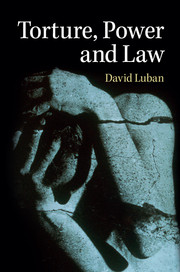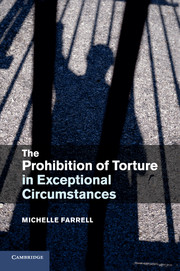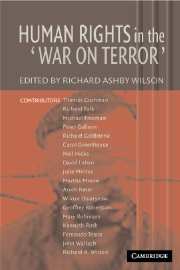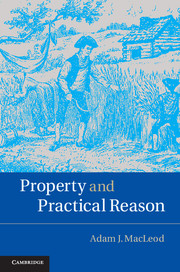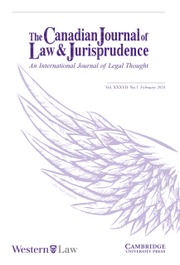Torture, Power, and Law
- Author: David Luban, Georgetown University, Washington DC
- Date Published: August 2014
- availability: This ISBN is for an eBook version which is distributed on our behalf by a third party.
- format: Adobe eBook Reader
- isbn: 9781316056790
Find out more about Cambridge eBooks
Adobe eBook Reader
Other available formats:
Hardback, Paperback
Looking for an inspection copy?
This title is not currently available on inspection
-
This volume brings together the most important writing on torture and the 'war on terror by one of the leading US voices in the torture debate. Philosopher and legal ethicist David Luban reflects on this contentious topic in a powerful sequence of essays including two new and previously unpublished pieces. He analyzes the trade-offs between security and human rights, as well as the connection between torture, humiliation, and human dignity, the fallacy of using ticking bomb scenarios in debates about torture, and the ethics of government lawyers. The book develops an illuminating and novel conception of torture as the use of pain and suffering to communicate absolute dominance over the victim. Factually stimulating and legally informed, this volume provides the clearest analysis to date of the torture debate. It brings the story up to date by discussing the Obama administration's failure to hold torturers accountable.
Read more- Combines theoretical philosophy with clear, up-to-date explanations of the law
- Brings together Luban's previously published material on the torture debate along with two newly written chapters
- Ties its arguments closely to newsworthy events and incorporates insights from military history, constitutional history, political science, and religious ethics
Awards
- Winner, 2015 PROSE Award for Philosophy
Reviews & endorsements
'David Luban has written over the past decade an extraordinarily compelling set of philosophical, legal (and simply human) reflections on what has unfortunately become a defining issue - torture. He raises crucial questions not only about the role of lawyers in legitimizing indefensible practices, but also about broader aspects of moral argument, especially the common practice of relying on 'extreme cases' and 'brainteasers' as alternatives to confronting more mundane (and horrific) realities. The book therefore promises to be important even after that happy day when torture has indeed been eliminated from the world.' Sanford Levinson, University of Texas, Austin
See more reviews'Of all those who have written on themes of justice and power in the aftermath of 9/11, David Luban's work is among the very best. His elegant argumentation and fluid prose effortlessly cross the boundaries between law, philosophy and political theory. Taken together, these essays provide a hugely compelling defence of fundamental rights in the face of those who have sought to weaken longstanding constitutional and moral protections. No one with an interest in society's response to torture or the broader debate on civil liberties can afford to ignore this book.' David Rodin, University of Oxford
'If there is but one book to pick from the shelf dealing with the US political crisis over the use of torture, then clearly it is David Luban's. With a merciless dissection of the semantic games played by Washington lawyers and a brilliant discussion of the key questions of law and ethics at the heart of the torture debate, Luban emerges as the subject's undisputed grand master.' Scott Horton, Columbia Law School
'David Luban's writing has been indispensable in the torture debates. No one has done more than he has to confront the 'ticking bomb' hypothetical. No one has engaged more deeply with our understanding of what torture is than Luban has in his essay on 'the communicative aspect of torture'. These writings represent perhaps the most serious and sensitive work that has emerged from this grim chapter in America's history.' Jeremy Waldron, New York University
Customer reviews
Not yet reviewed
Be the first to review
Review was not posted due to profanity
×Product details
- Date Published: August 2014
- format: Adobe eBook Reader
- isbn: 9781316056790
- availability: This ISBN is for an eBook version which is distributed on our behalf by a third party.
Table of Contents
Preface
Part I. Downgrading Rights and Expanding Power During Post-9/11 Panic:
1. The war on terrorism and the end of human rights
2. Eight fallacies about liberty and security
Part II. The Ticking Bomb as Moral Fantasy and Moral Fraud:
3. Liberalism, torture, and the ticking bomb
4. Unthinking the ticking bomb
Part III. The Evils of Torture:
5. A communicative conception of torture
6. Human dignity, humiliation, and torture
7. Mental torture: a critique of erasures in US law (with Henry Shue)
Part IV. Complicity in Torture:
8. The torture lawyers of Washington
9. Tales of terror: lessons for lawyers from the war on terrorism
10. An affair to remember.
Sorry, this resource is locked
Please register or sign in to request access. If you are having problems accessing these resources please email [email protected]
Register Sign in» Proceed
You are now leaving the Cambridge University Press website. Your eBook purchase and download will be completed by our partner www.ebooks.com. Please see the permission section of the www.ebooks.com catalogue page for details of the print & copy limits on our eBooks.
Continue ×Are you sure you want to delete your account?
This cannot be undone.
Thank you for your feedback which will help us improve our service.
If you requested a response, we will make sure to get back to you shortly.
×
